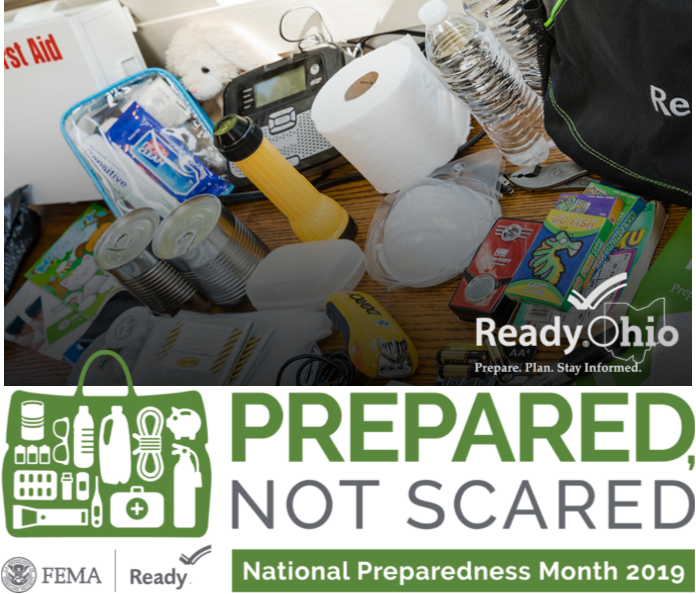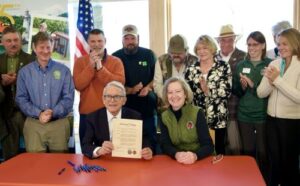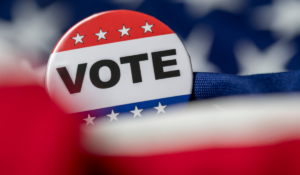September National Preparedness Month


September National Preparedness Month
COLUMBUS, Ohio – September is National Preparedness Month. It is a great time for Ohioans to take steps now to ensure they are better prepared for any disaster.
“It’s never too late to plan and prepare for disasters,” Governor Mike DeWine said. “Emergencies and disasters can happen anywhere, at any time, often without any warning. National Preparedness Month is a good time for individuals and organizations to take steps to be better prepared for the next disaster.”
“Take a few moments today and make plans to protect your loved ones,” said Sima Merick, Executive Director of the Ohio Emergency Management Agency. “Knowing what hazards or severe weather events could impact your area; making and practicing your emergency plans; updating your disaster supply kits – these are just some things everyone can do to be self-sufficient, and to enhance community resilience.”
Don’t think disasters happen in Ohio? Think again. Ohio was hit with 21 tornadoes Memorial Day and the next morning, 15 in the Dayton area, including two EF-3 tornadoes. A Presidential Disaster was declared for 11 Ohio counties for storms from May 27-29. Governor Mike DeWine earlier this month authorized the use of the State Disaster Relief Program to help communities in nine Ohio counties impacted by several severe weather incidents between April and July of this year. Another seven counties are eligible for low-interest loans from the U.S. Small Business Association after storms led to severe flooding in Auglaize County and adjacent counties May 17.
The theme for this year’s Ready campaign is: Prepared, Not Scared. If you know what to do and are prepared for emergencies or disasters, you’re less likely to be scared.
National Preparedness Month (NPM) is recognized annually to promote family and community disaster/emergency planning, not only in September, but throughout the year. NPM is designed to raise awareness and encourage people to prepare themselves for emergencies that could impact their homes, jobs, schools, and communities.
In coordination with FEMA’s Ready campaign, Ohio EMA and ReadyOhio encourage households, county EMAs, businesses, schools, and places of worship to have an evacuation plan — they need to be prepared, and not scared, by participating in NPM’s weekly themes for 2019:
- Week 1 (Sept. 1-7) Save Early for Disaster Costs
- Week 2 (Sept. 8-14) Make a Plan to Prepare for Disasters
- Week 3 (Sept. 15-21) Teach Youth to Prepare for Disasters
- Week 4 (Sept. 22-30) Get Involved in Your Community’s Preparedness
During National Preparedness Month, Ohio EMA is going to show how to build an emergency preparedness kit on a budget. This safety campaign is dubbed #PrepOnABudget. Ohio EMA will show that you can build a disaster preparedness kit without breaking the bank, buying items that cost about $1 a piece. Follow Ohio EMA on Facebook, Twitter and watch on Nextdoor as they put together a disaster preparedness kit $1 at a time. For more, go to www.ema.ohio.gov.
Additional NPM Actions for Emergency Preparedness:
- Organize disaster supply kits for your home and vehicles. A supply kit is a collection of basic items your household may need, in the event of an emergency. Most items in a basic kit are inexpensive and easy to find. And you might already have a lot of the items in your home. After a disaster happens, you may need to survive on your own for several days. Your disaster kits should have enough food, water, and other essential items to sustain everyone in your home (including pets) for at least three days.
- Take time to learn life-saving skills – actions you can take to prepare for and protect against disasters and severe weather events. Install smoke, carbon monoxide and natural gas detectors, and test them monthly. Know how to turn off utilities, like water and gas. Talk to your landlord or building manager about evacuation routes and fire safety. Know two ways out of your home in case of a fire and practice evacuation plans.
- Check your insurance policies and coverage for the hazards that might impact your home or community, such as flooding, tornadoes or home fires.
Consider the costs associated with disasters. Consider saving money in an emergency savings account that could be used in any crisis. Keep a small amount of cash at home in a safe place. Have small bills on hand because ATMs and credit cards may not work after a disaster when you may need to purchase necessary supplies, fuel or food.
Visit ReadyOhio for additional information on NPM’s weekly themes and Ohio’s Disaster Preparedness on a Budget.









